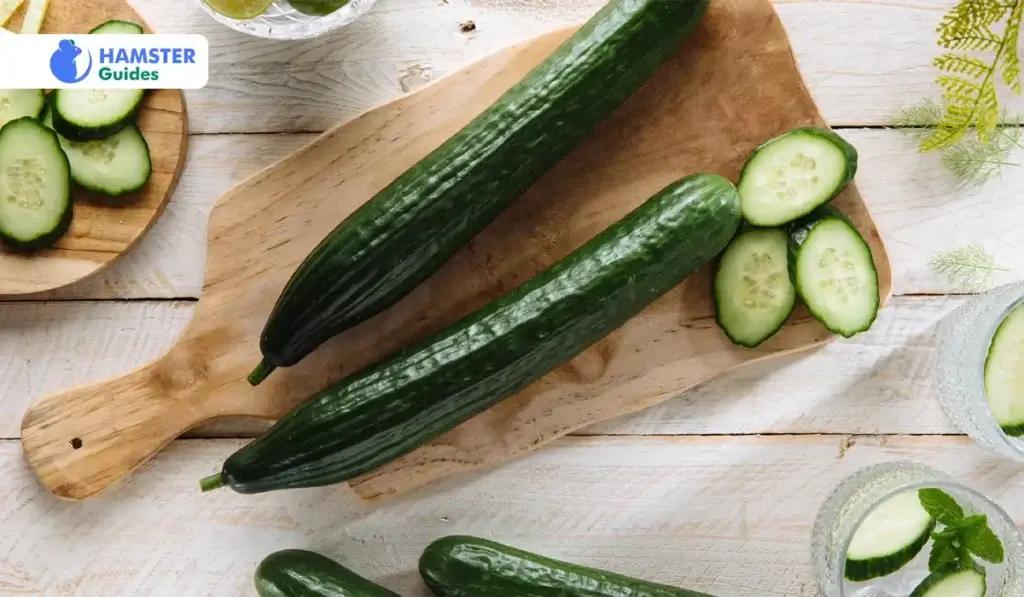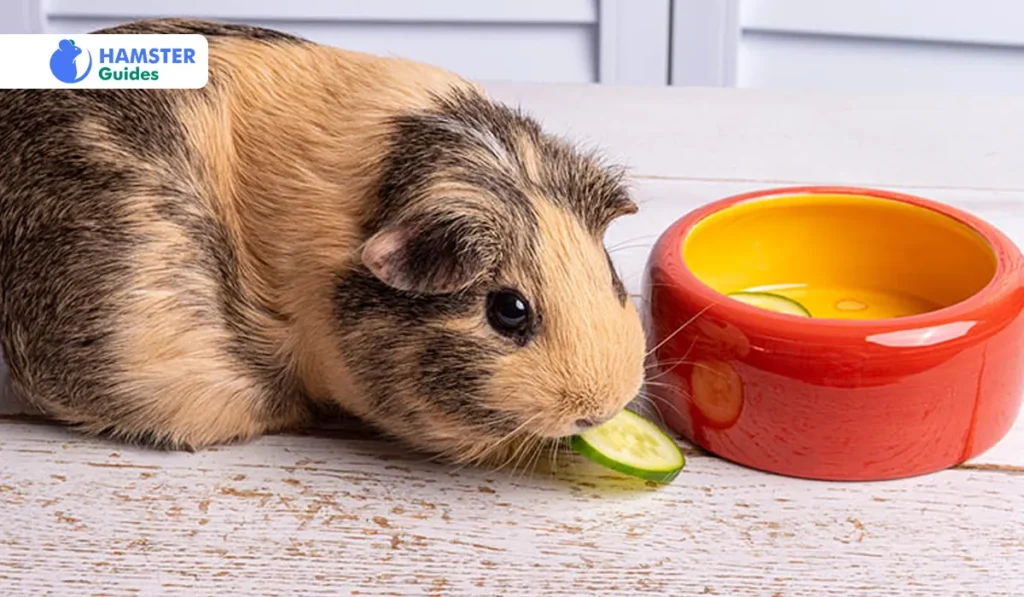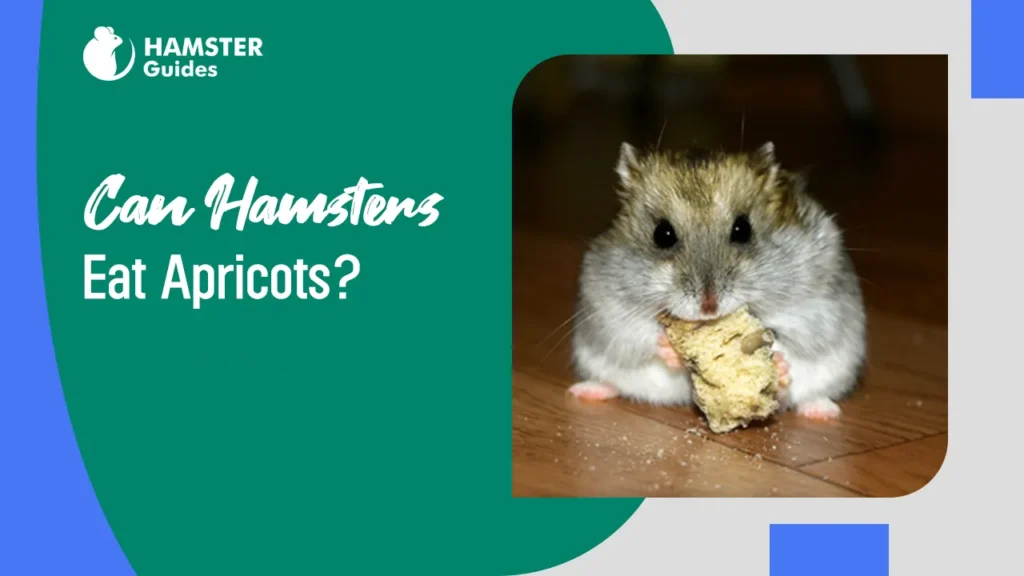Can Hamsters Eat Cucumber?
Hamsters, renowned for their little paws and charming, mischievous behaviour, have consistently captivated the affections of pet fans across the globe. When you are responsible for caring for these furry creatures, it is only natural that you would want to ensure that they are both content and healthy. “Can hamsters eat cucumber?” is the most frequently asked question, along with many others.
Yes, that is the shortest answer; however, there’s more to know.
This blog will explore the hamster’s diet with a combination of understanding and helpful guidance. Moreover, it will provide insight into the question, “Can hamsters eat cucumber seeds, skin, or leaves?” Let’s delve into this discussion.
Nutritional Value Of Cucumber

A cucumber’s main ingredient is water; however, it contains comparatively little fat, carbohydrates, or calories. Moreover, it also includes vital minerals and vitamins like manganese, potassium, and vitamins K and C.
| Nutrient | Amount Per 100g | Benefits |
| Calories | 15 kcal | This value of calories gives hamsters low-calorie hydration, particularly during hot times. |
| Water | 95.23 g | Water maintains hydration and promotes general body functions in hamsters. |
| Protein | 0.65 g | Protein helps with muscle growth and regeneration. |
| Carbohydrates | 3.63 g | Carbohydrates give energy for everyday tasks. |
| Fiber | 0.5 g | Dietary fiber promotes gut health, aids digestion, and helps avoid constipation. |
| Sugars | 1.67 g | Sugars give hamsters active, quick energy. |
| Fat | 0.11 g | Fat promotes hair and skin health. |
| Vitamin C | 2.8 mg | Vitamin C strengthens the immune system and encourages healthy hair and skin. |
| Vitamin K | 16.4 μg | Vitamin K promotes bone health and blood clotting. |
| Potassium | 147 mg | Potassium maintains optimal nerve and muscle function and controls fluid balance. |
| Magnesium | 13 mg | Magnesium promotes the health of bones and muscles. |
| Manganese | 0.079 mg | Manganese participates in the processes of metabolism and antioxidant defense. |
| Folate | 7μg | Folate is necessary for the development and division of cells. |
| Calcium | 16 mg | Calcium is vital to the health of bones and teeth. |
Additional Information: Hamsters will seek out shredded paper or hay, two materials that they find in abundance, and use them to construct warm nests in their cages. Giving them things to build nests makes them feel safe and enables them to act more naturally.
The Compatibility of Cucumber And Hamsters
Knowing the nutritional advantages of cucumbers and any possible hazards related to specific parts of the plant is essential when deciding whether or not hamsters can consume them. However, for hamsters, cucumbers are a low-calorie, refreshing delight packed with vital nutrients. As for “Can hamsters eat cucumber seeds?” You should proceed cautiously with cucumber seeds.

Some hamsters might have a little trouble eating cucumber seeds. However, others might choke or get gastrointestinal obstructions. Consequently, taking out the seeds before giving your pet a cucumber is best, mainly if they prefer to eat quickly.
Related Resource: Can Hamsters Eat Bok Choy?
Can Hamsters Eat Cucumber Skin?
Additionally, the question, “Can hamsters eat cucumber skin?” raises concerns about possible choking hazards and traces of pesticides. However, the peel itself is not poisonous to hamsters, and the use of pesticides in industrial farming may be hazardous.

Consider organic cucumbers to reduce the risk, or cleanse and peel regular-grown cucumbers well before giving them to your furry friend. Cucumber peeling may also be difficult for hamsters to consume and absorb, which raises the possibility of gastrointestinal discomfort or obstructions. It is, therefore, better to cut off the peel and serve the cucumber alone as a treat.
Regarding the question, “Can hamsters eat cucumber skin?” It’s imperative to know the difference between the inner and outer layers of the skin. However, the peel should usually be removed to reduce the risk of choking hazards and pesticide contamination; hamsters can safely eat the thin, fragile skin beneath it.
The outer layer adds a crunchy feel that hamsters find appealing and has substantial nutrients. Merely, just as with any new meal, it’s essential to gradually add cucumber skin to your furry friend’s diet and watch for any adverse reactions.
Can Hamsters Eat Cucumber Leaves?
It is important to remember that cucumber plants are members of the Cucurbitaceae family, including squash and pumpkin; however, consider this question: “Can hamsters eat cucumber leaves?” Although cucumber leaves may not directly harm hamsters, several substances they contain may disrupt their digestive systems or trigger allergic reactions.
As a result, it is advisable to only give your hamster the fleshy portion of the cucumber as a healthy and safe treat rather than the leaves.
Additional Information: Shockingly, hamsters can run at rates of up to eight miles per hour or thirteen kilometers per hour. In the wild, their nimbleness helps them avoid danger.
Different Treats For Hamsters
Adding a range of veggies to your hamster’s diet will spice it up and provide a more nutritious variety. Cucumbers are high in water content and important vitamins, but when combined with other veggies, they offer a well-rounded treat that meets your pet’s nutritional needs and appetite.
Can Hamsters Eat Cucumber and Tomatoes?
One must proceed cautiously when considering, “Can hamsters eat cucumber and tomatoes?” Tomatoes are considered vegetables in culinary contexts, even though they are essentially fruits. Tomatoes can supplement your hamster’s diet with extra vitamins and antioxidants, but you should only give them a small amount because of their acidity and risk of upset stomach.

To avoid choking hazards and facilitate easy digestion, ensure cucumbers and tomatoes are provided in small, manageable pieces after thoroughly cleaning.
Related Resource: Can Hamsters Eat Melon?
The Combination of Cocumber and Carrots
“Can hamsters eat cucumber and carrots?” Cucumbers and carrots are generally safe for hamsters to consume in moderation. The crisp, vitamin-rich carrots complement the cucumbers’ moisturizing properties. Because of their elevated sugar content, it is crucial to restrict the quantity of carrots provided to avoid weight gain and dental problems in hamsters.

Including a range of veggies, such as tomatoes, cucumbers, and carrots, can provide your hamster with a healthy, balanced treat that promotes its general health and well-being. To customize your hamster’s diet to its preferences, try various combinations and pay attention to its inclinations.
To guarantee your pet has a joyful and healthy eating experience, gradually introduce new foods and watch for any adverse reactions.
Pro Tip: To preserve your hamsters’ comfort and well-being, keep their habitat consistently between 65-75 F., and keep their cage away from drafts and direct sunlight.
The Concerns for Cucumber that Leads To Health Issues
To keep your hamster healthy and happy, research the possible hazards of giving it cucumbers. Cucumbers may seem delicious and pleasant, but appropriate pet care requires knowing the potential risks.

We explore the concerns of providing hamsters with cucumbers, including choking hazards, upset stomachs, and pesticide exposure.
By being aware of these concerns, you may prevent these problems from occurring and ensure your pet has a safe and pleasurable dining experience.
Related Resource: Can Hamsters Eat Garlic?
Pesticide Exposure
If you give your hamster commercially farmed cucumbers, it may be exposed to pesticides. Cucumbers are frequently treated with insecticides during production to protect them from pests and illnesses.

However, if your hamster consumes these substances, it may become poisoned or experience other health problems. When feasible, choose organic cucumbers to reduce your pesticide exposure, and thoroughly wash commercially cultivated cucumbers before giving them to your hamster.
Digestive Distress
The potential for digestive distress is a worry. However, hamsters can take cucumbers well; too much of them cause gastrointestinal distress or diarrhea. This is particularly true if your hamster eats cucumber seeds, which can obstruct the gastrointestinal tract and be challenging to digest.
Remove the seeds before giving your hamster any cucumbers, and only give them tiny, infrequent portions to reduce this risk.
Allergic Reactions

However, although they are uncommon, hamsters may be allergic to or sensitive to cucumbers. Itching, swelling, or respiratory distress are some of the symptoms of an allergic reaction.
If your hamster starts exhibiting strange symptoms after you feed it cucumbers, stop feeding it and seek advice from a veterinarian.
Choking Hazard
The possibility of choking is one of the main dangers of giving cucumbers to hamsters. Cucumbers can be a choking hazard for smaller hamster breeds or tend to eat quickly if not chopped into tiny, bite-sized pieces.
This is especially true for smaller hamster types or ones that eat quickly. Always cut cucumber slices into little bits before giving them to your hamster to reduce the risk.
Related Resource: Can Hamsters Eat Raisins?
Developing a Nutritious Diet For Hamsters
Creating wholesome food is essential for your hamster’s general health and welfare. We will look at a few ways to make a balanced food that meets your hamster’s nutritional requirements.

The Final Words
Wrapping up this blog to give these cherished creatures the best care possible requires an awareness of the complexities of hamster nutrition, including the advantages and disadvantages of feeding cucumbers. However, cucumbers can provide hamsters with vital nutrients and hydration, but it is essential to be aware of risks of choking hazards, upset stomachs, pesticide exposure, and allergic reactions.
You may contribute to a balanced diet that promotes your hamster’s health and well-being by giving cucumbers in moderation and in addition to a variety of other nutrient-dense foods. You and your pet can have many happy and healthy years together if you provide the proper care and meet their nutritional needs.









Leave a Reply